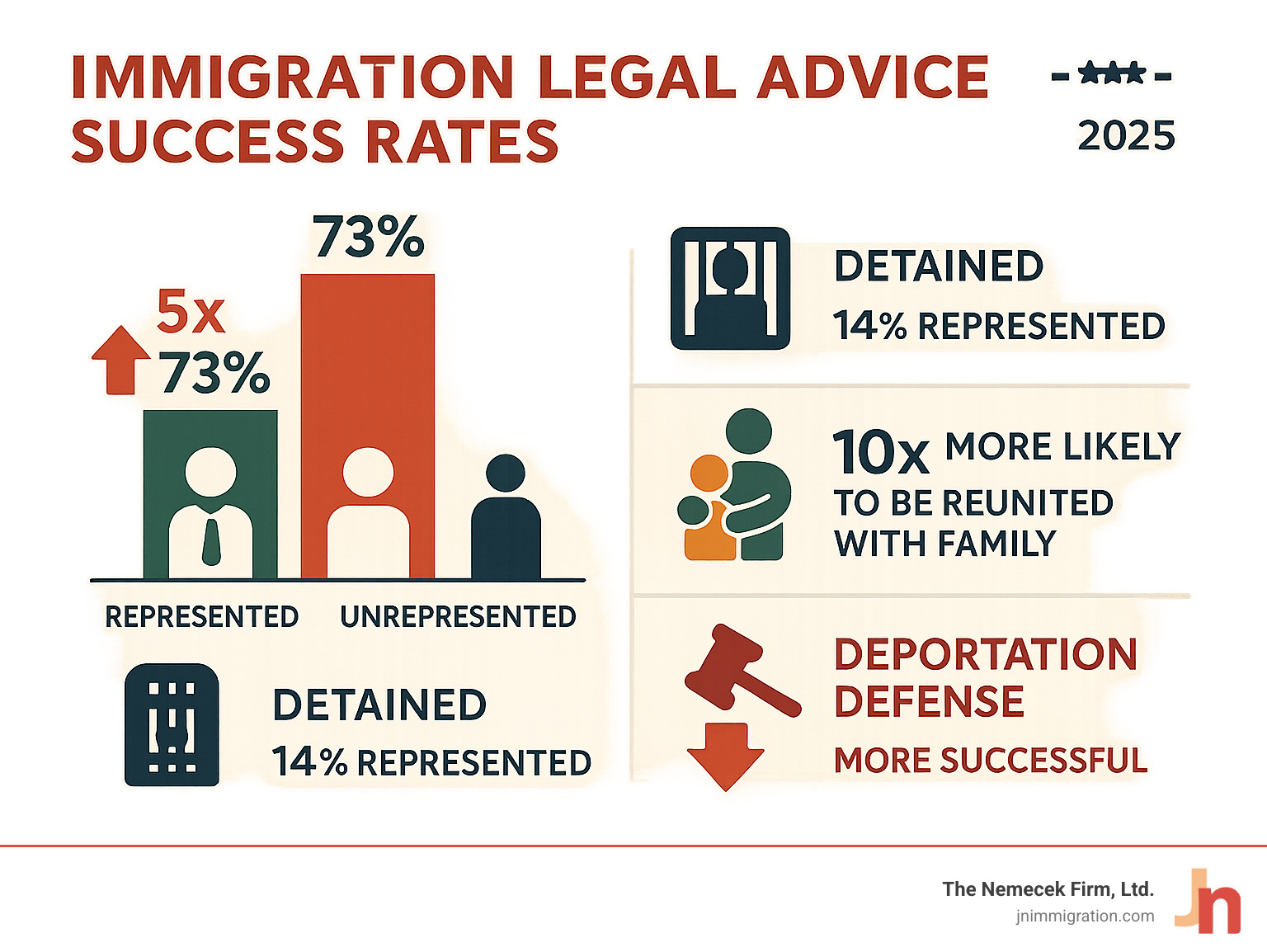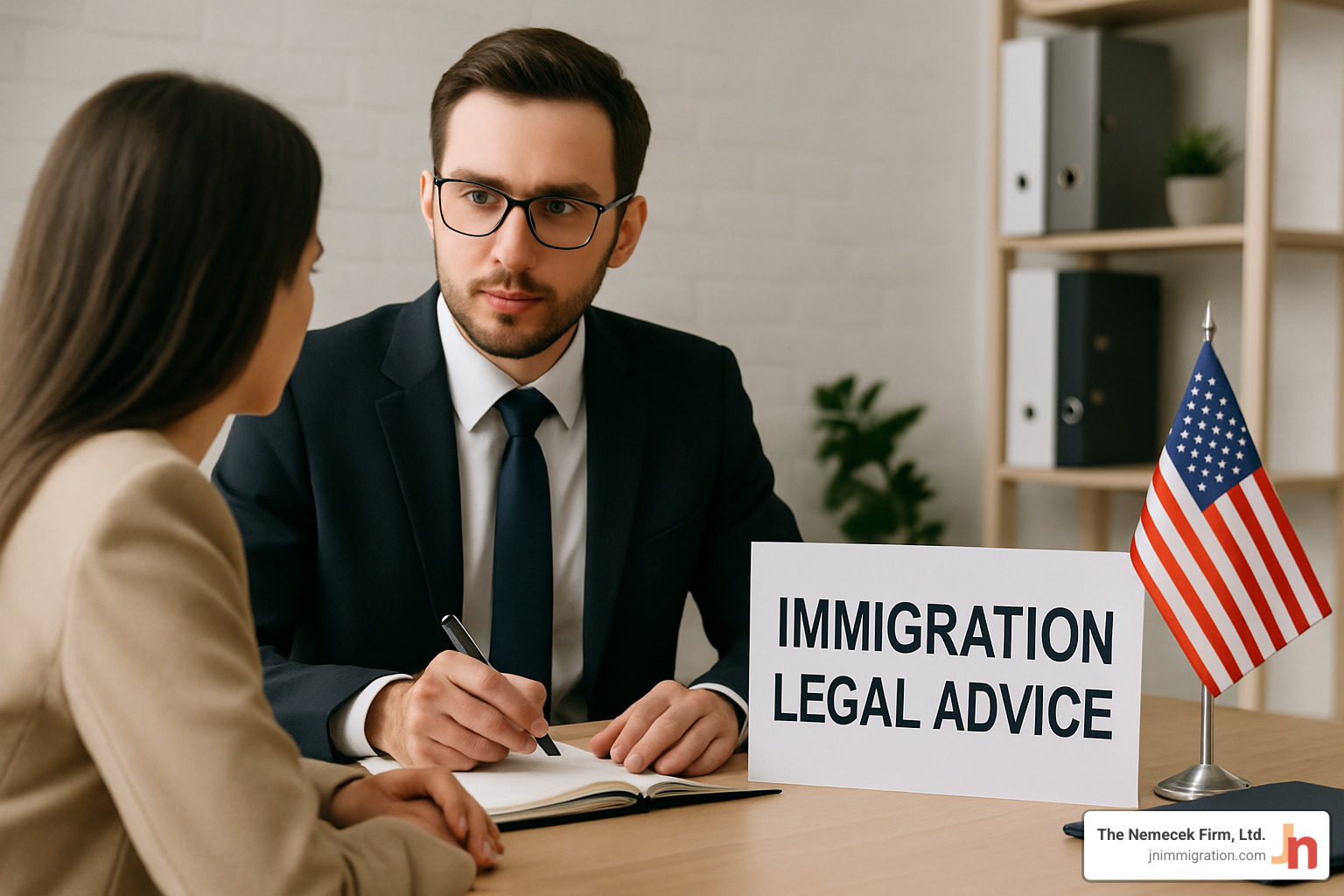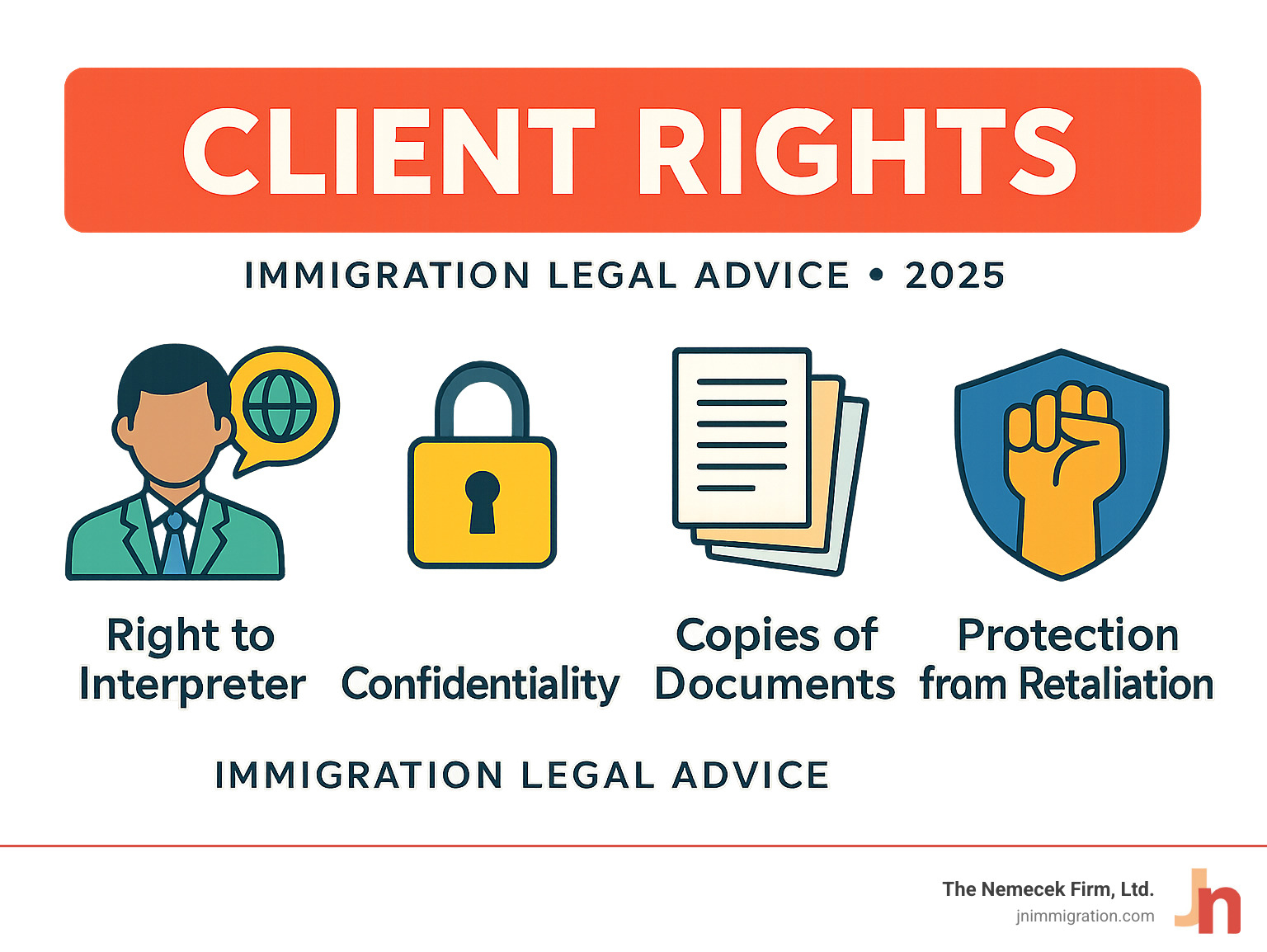
Getting proper immigration legal advice can be the difference between success and deportation. Here’s what you need to know right now:
Who Can Give Legal Immigration Advice:
Who CANNOT Give Legal Immigration Advice:
Key Statistics:
The gap between those who get help and those who don’t is staggering. While detained immigrants have just a 14% representation rate, programs like New York’s NYIFUP show that universal representation makes represented individuals 10 times more likely to win their cases.
The stakes are too high to risk getting advice from someone who isn’t qualified to give it.
Notario fraud alone affects millions of immigrants who mistake notaries for attorneys. These unqualified providers often file incorrect applications, miss critical deadlines, and leave families in worse legal situations than when they started.
Whether you’re facing deportation, applying for a visa, or seeking asylum, the quality of your legal guidance will shape your entire future in America.

Here’s the truth: only two types of people can legally give you immigration legal advice. Before you share personal information or hand over any money, you need to know exactly who these authorized providers are.
Licensed attorneys are your first option. These are lawyers who hold a valid state license and are in good standing with their state bar association. They’ve completed law school, passed the bar exam, and can represent you everywhere that matters – USCIS offices, Immigration Court, and the Board of Immigration Appeals.
BIA-accredited representatives are your second option. These folks work for nonprofit organizations that the Department of Justice has officially recognized. They’ve completed rigorous training and passed background checks specifically to help low-income immigrants steer the system.
Want to verify an attorney? Contact their state bar association and ask for their license number. Make sure they’re in good standing – not suspended or facing disciplinary action. The Executive Office for Immigration Review (EOIR) keeps a discipline list of practitioners who’ve gotten into trouble. Check it.
For accredited representatives, head to the DOJ roster of recognized organizations and representatives. This list gets updated regularly and shows exactly what each representative is authorized to do.
Here’s how licensed attorneys and DOJ-accredited representatives compare:
| Feature | Licensed Attorneys | DOJ-Accredited Representatives |
|---|---|---|
| Can represent in Immigration Court | Yes | Yes (if authorized) |
| Can file USCIS applications | Yes | Yes (if authorized) |
| Can charge fees | Yes | Limited (must be reasonable) |
| Works for nonprofit | Not required | Required |
| Disciplinary oversight | State bar | DOJ/EOIR |
The key difference? Attorneys have more flexibility in their practice and fee structure, while accredited representatives focus on serving low-income communities through nonprofit organizations.
Real immigration legal advice isn’t just about filling out forms. It’s much more comprehensive than that.
Legal assessment means someone evaluates your specific situation and tells you what immigration options you might have. They look at your history, your family situation, and any potential problems that could come up.
Form guidance goes beyond just checking boxes. It involves knowing which applications to file, when to file them, and how different forms might affect each other. The timing can make or break your case.
Court representation becomes critical if you’re in removal proceedings. Your representative needs to understand immigration law, court procedures, and how to present your case effectively.
Strategy development is where experience really matters. Complex cases involving multiple family members or previous immigration violations require careful planning and sequencing of applications.
If someone is providing this level of guidance, they must be properly authorized. No exceptions.
This is where things get dangerous for immigrants. Lots of people offer immigration help, but most of them can’t legally give you immigration legal advice.

Notario públicos cause more immigration disasters than almost anyone else. In many Latin American countries, notarios are lawyers with real legal authority. In the United States? They can only witness signatures and administer oaths. That’s it. They cannot give legal advice about anything, including immigration.
Immigration consultants love to make themselves sound official with fancy websites and professional-looking offices. But they’re not authorized to provide legal advice. They can only help fill out forms, and even that comes with huge risks if they don’t understand what they’re doing.
Travel agencies and document preparers sometimes offer immigration services on the side. They lack the legal training to properly advise you, and their mistakes can result in denied applications, deportation proceedings, or permanent bars to re-entry.
Unlicensed preparers of all kinds pose serious fraud risks. They often promise quick results or claim they have special relationships with government officials. They charge high fees for services that should be free, file incorrect applications, miss critical deadlines, and disappear when problems arise.
The bottom line? If someone isn’t a licensed attorney or a DOJ-accredited representative, they cannot legally give you immigration advice. Period. Don’t risk your future on someone who isn’t qualified to help you.
Here’s the thing about immigration legal advice – once you hand over your personal documents or pay someone, it’s often too late to undo the damage if they’re not qualified. That’s why smart verification comes first, always.
Think of it like hiring a babysitter for your most precious child. You wouldn’t just trust someone because they look professional, right? The same careful approach applies here, except the stakes are even higher – we’re talking about your entire future in America.
Start with your state bar association’s website. Every state keeps an online directory that’s surprisingly easy to use. Just type in the attorney’s name and you’ll see their license status, the date they were admitted to practice, and any disciplinary actions. It’s like a report card for lawyers, and it’s all public information.
If you’re looking at a DOJ-accredited representative instead, head straight to the Department of Justice’s official roster. This isn’t some random website – it’s the government’s own list showing exactly which services each representative can provide and which organizations they work for.
The American Bar Association also offers helpful tools to find qualified immigration attorneys in your area. Their directory includes details about experience levels and practice areas, which can help you find someone who actually handles cases like yours.
Now, let’s talk about something that keeps me up at night: identity theft in immigration cases. Unauthorized providers love collecting personal information and documents that they can misuse later. Your Social Security number, passport, and other sensitive documents are gold mines for criminals.
Never, ever give anyone your original documents during an initial consultation. Always provide copies and keep those originals locked away somewhere safe. A legitimate attorney will understand this completely – in fact, they’ll probably suggest it themselves.
Share this resource about finding qualified legal help with others who might need it.
I promise you can do this verification faster than it takes to make coffee. Here’s exactly how:
Search the state bar website first – type in their name and make sure their license shows as active. Ask for their license number upfront if you can’t find them easily. Any legitimate attorney will give you this information without hesitation.
Check their disciplinary history while you’re on the bar website. Look for any sanctions, suspensions, or other red flags. Verify their office address too – make sure they have a real business location, not just a P.O. box or residential address.
Finally, check the EOIR disciplined practitioners list to ensure they’re not barred from immigration practice specifically. Some attorneys might be in good standing with their state bar but prohibited from handling immigration cases.
Watch out for these major red flags: anyone who refuses to provide license information, claims to be an attorney but isn’t listed anywhere, promises guaranteed results, or asks for cash-only payments. If someone operates out of their home and can’t provide references from other clients, keep looking.
Trust your instincts here. If something feels off during this verification process, it probably is. There are plenty of qualified, honest attorneys out there – you don’t need to settle for someone who makes you uncomfortable.
You don’t have to steer the immigration system alone, and you definitely don’t have to break the bank to get proper immigration legal advice. Thousands of immigrants qualify for free or affordable legal help every year – the trick is knowing where to look.
ImmigrationLawHelp.org should be your first stop. This massive directory connects you with nonprofit immigration attorneys and accredited representatives across the country. What makes it special? Every organization listed has been pre-screened for quality, and the site works in 13 different languages. You can search by your specific location or even by detention facility if that’s relevant to your situation.
LawHelp.org offers another treasure trove of resources. Just click on your state and you’ll find legal aid organizations that provide immigration services alongside other types of legal help. Many of these groups specifically serve low-income families and individuals.
Don’t overlook Catholic Charities – they operate immigration programs in communities nationwide, and you don’t need to be Catholic to get help. Their attorneys and DOJ-accredited representatives handle everything from helping families reunite to defending against deportation.
The government also maintains the EOIR Pro Bono List, which includes attorneys who’ve committed to providing at least 50 hours of free legal services each year. This list gets updated every three months, so you’re seeing current information about who’s available to help.
Here’s a pro tip: many of these directories let you filter by language. If English isn’t your strongest language, finding someone who can communicate with you clearly is crucial for getting the best immigration legal advice possible.
If you’re ready to explore your options with an experienced attorney, get a consultation to discuss what path might work best for your situation.
Being detained makes everything harder, but specialized programs exist specifically to help people in immigration detention. The New York Immigrant Family Unity Project (NYIFUP) pioneered universal representation for detained immigrants, and their success has inspired similar programs elsewhere.
Asylum seekers face particularly complex legal challenges, which is why many bar associations run special pro bono programs just for asylum cases. These cases require deep expertise, and these specialized programs connect asylum seekers with attorneys who really understand the process.
Young immigrants – including DACA recipients and kids who came to the U.S. without parents – have access to organizations that focus specifically on children’s immigration issues. These groups understand the unique legal protections available to minors.
If you’re a survivor of domestic violence, you may qualify for special immigration protections like U visas or VAWA self-petitions. Many organizations provide free legal help specifically designed for survivors, understanding both the legal complexities and the sensitive nature of these cases.
The government’s EOIR Pro Bono Portal offers additional resources and can help you find services in your area, especially if you’re facing removal proceedings.
Walking into a consultation unprepared is like going to a job interview without a resume. You’ll get much better immigration legal advice when you show up organized and ready to discuss your case in detail.
Think of your first consultation as a chance to tell your complete immigration story. The more information you bring, the better your attorney or accredited representative can assess your situation and explain your options.

Start by gathering all your immigration documents. This includes any green cards, visas, I-94 arrival/departure records, and notices you’ve received from USCIS or Immigration Court. Don’t forget about passports and travel documents – even expired ones can be important for establishing your immigration history.
Personal documents like birth certificates and marriage certificates help prove family relationships that might be crucial for your case. If you’ve ever had any criminal issues, bring all court documents, even for minor offenses that were dismissed.
Your work history matters too. Bring employment authorization documents, tax returns, and employment records. These documents can support various types of immigration applications and show your ties to the United States.
If you’ve filed previous immigration applications, bring copies of everything – even applications that were denied. Your legal provider needs to understand what’s been tried before and why it didn’t work.
Here’s a pro tip: make copies of everything and bring both the originals and copies. Never leave your original documents with anyone unless you’re actually filing an application and receiving proper receipts. Those documents are irreplaceable.
Create a timeline of your immigration history before your appointment. Write down when you first came to the United States, any times you left and returned, and any interactions with immigration authorities. This chronology helps your legal provider spot potential issues and opportunities quickly.
Don’t forget to write down your questions beforehand. It’s easy to forget important things when you’re nervous or overwhelmed. Having a written list ensures you get all your concerns addressed.
If you decide to hire representation, you’ll need Form G-28 (Notice of Entry of Appearance as Attorney or Accredited Representative). This official document tells USCIS and Immigration Court that someone is authorized to represent you. Keep copies of all fee receipts – you’ll need them for your records.
Getting good immigration legal advice isn’t just about finding the right person – it’s also about protecting yourself throughout the process. You have important rights, and knowing them can save you from costly mistakes.
Always keep copies of every document you give to your legal representative. Create your own complete file with all correspondence, receipts, and case documents. If something goes wrong or you need to change attorneys, you’ll have everything you need.
Don’t sign anything you don’t understand. If English isn’t your first language, you have the right to a translator during meetings and for document review. A good attorney or accredited representative will make sure you fully understand everything before asking for your signature.
Ask about confidentiality upfront. Communications with licensed attorneys are protected by attorney-client privilege, but the rules might be different for accredited representatives. Understanding these protections helps you communicate more effectively about sensitive issues.
Seeking legal help cannot be used against you in immigration proceedings. In fact, getting proper legal advice usually improves your chances of success. Don’t let fear of government retaliation prevent you from getting the help you need.

If something feels wrong during the process – whether it’s pressure to sign documents quickly, requests for unusual payments, or promises that sound too good to be true – trust your instincts. You have the right to take time to consider your options and seek a second opinion.
Good legal representatives want informed clients who understand their cases. If someone gets frustrated with your questions or refuses to explain things clearly, that’s a red flag worth paying attention to.
Once you’ve found qualified representation, the real work begins. Getting the best immigration legal advice isn’t just about finding the right attorney or accredited representative – it’s about building a partnership that leads to success.
Your legal provider should sit down with you to develop a clear case strategy that makes sense for your specific situation. This isn’t a one-size-fits-all conversation. They should explain your options in plain English, tell you honestly about your chances of success, and give you a realistic timeline for your case.
Don’t be afraid to ask questions until you truly understand the plan. If something doesn’t make sense, speak up. You’re not being difficult – you’re being smart.
Establish a communication plan right from the start. Some attorneys prefer email, others use phone calls, and some have client portals where you can check on your case. Figure out what works for both of you and stick to it.
Ask how often you’ll get updates and how quickly you can expect responses to your questions. Immigration cases can drag on for months or even years, and knowing what to expect helps you stay sane during the process.
Track your case status using the tools available to you. USCIS has online tracking systems that let you monitor your application’s progress. Your representative should give you all the receipt numbers and show you how to use these tools.
It’s actually pretty satisfying to see your case move through the system, even if it happens slowly.
The biggest favor you can do for yourself and your legal team is to avoid delays by staying on top of your responsibilities. When they ask for documents, get them as quickly as possible. When USCIS requests additional evidence, don’t wait until the last minute to respond.
Immigration deadlines are not suggestions – they’re requirements that can make or break your case.
Work with an affordable immigration attorney who understands your budget constraints while providing quality representation.
Your immigration legal advice sessions will cover different topics depending on your situation, but there are some common themes that come up again and again.
Family petitions are all about bringing loved ones together. Whether you’re trying to bring your spouse, children, parents, or siblings to the United States, these cases require mountains of paperwork to prove your relationships are real. Your attorney will help you gather birth certificates, marriage certificates, and other documents that show your family connections.
Employment visas can range from temporary work permits to permanent residence through your job. Each type has its own quirks and requirements. Some need labor certifications, others require specific education levels, and all of them involve timing that can make your head spin.
Asylum cases are deeply personal and often traumatic to discuss. You’ll need to share difficult experiences and provide evidence of persecution or threats in your home country. A good legal provider will handle these conversations with sensitivity while making sure your case is as strong as possible.
Deportation defense is high-stakes work that requires immediate attention. If you’re in removal proceedings, every day counts. Your attorney will explore every possible form of relief and fight to keep you with your family.
Citizenship applications might seem straightforward, but they can get complicated quickly. Issues like trips outside the country, tax problems, or old criminal charges can all affect your eligibility. Your legal provider will review your entire history to spot potential problems before they derail your application.
Waivers come into play when you need to overcome barriers to getting a visa or green card. These applications require showing that your qualifying relatives would suffer extreme hardship if you were denied. It’s not enough to say it would be difficult – you need to prove it with evidence.
After your consultation, you’ll have a roadmap for moving forward. The next steps usually involve several important tasks that require your attention and follow-through.
Filing deadlines in immigration cases are absolutely critical. Miss a deadline, and you could lose your chance entirely. Your legal provider should give you a calendar with all important dates marked clearly. Put these dates in your phone, write them on your bathroom mirror, or tattoo them on your arm if necessary – just don’t miss them.
Evidence gathering often takes longer than people expect. Getting documents from foreign governments can take months, and some records might not even exist anymore. Start this process as early as possible and have backup plans for missing documents.
Fee payments to government agencies can add up quickly. A single green card application can cost over $2,000 in government fees alone, not counting attorney fees. Budget for these costs upfront so you’re not scrambling to find money when it’s time to file.
Biometrics appointments are scheduled by USCIS, not by you. When you get the notice, show up on time with proper identification. These appointments are usually quick and painless, but missing one can cause serious delays or even denials.
Interview preparation is crucial for many types of cases. Your legal provider should help you practice answering questions and review your case file beforehand. The more prepared you are, the more confident you’ll feel walking into that interview room.

Here’s the truth: immigration law is never as simple as it looks on the surface. What seems like a straightforward case to you might have hidden traps that only become visible to someone with legal training.
Think about it this way – you wouldn’t perform surgery on yourself just because you watched a YouTube video, right? Immigration cases work the same way. There are eligibility requirements you might not know about, timing issues that could affect your entire family, and potential consequences that aren’t obvious until it’s too late.
The statistics don’t lie. Immigrants with proper immigration legal advice are five times more likely to win their cases. This isn’t just for complicated deportation cases – it applies to family petitions, work visas, and even citizenship applications that seem “easy.”
Consider this: the cost of getting professional help upfront is almost always less than trying to fix problems later. Denied applications often can’t be refiled, and some mistakes can bar you from immigration benefits forever.
Even if you’re just unsure, a consultation can give you peace of mind. Many attorneys offer affordable initial consultations where they can spot potential issues and help you understand exactly what you’re dealing with.
If someone has taken advantage of you with fake immigration legal advice, you’re not alone – and you have options to fight back.
Start with the Federal Trade Commission (FTC). You can file a complaint online at www.ftc.gov/complaint or call 1-877-382-4357. The FTC investigates fraudulent businesses and sometimes helps people get their money back.
Your state attorney general’s office is another powerful ally. Many states have special programs to combat notario fraud and other immigration scams. They can investigate and sometimes prosecute these cases.
If the scammer claimed to be an attorney, report them to your state bar association immediately. The bar takes unauthorized practice of law very seriously and can take action to stop them.
For notario fraud specifically, StopNotarioFraud.org provides resources and can connect you with agencies that specialize in helping victims.
Document everything – contracts, receipts, emails, text messages, business cards. This evidence is crucial for any investigation. The more information you can provide, the better chance authorities have of stopping the scammer and helping you.
Reporting the fraud doesn’t just help you – it protects other families from becoming victims of the same scam.
If you’ve been hurt by a notario or other unauthorized person giving fake immigration legal advice, don’t panic. You can often fix the damage, but you need to act fast.
Stop working with them immediately. Don’t give them another penny or another document. Cut off all contact right now.
Get real legal help as soon as possible. Contact a licensed immigration attorney or DOJ-accredited representative to assess what went wrong and figure out how to fix it. Sometimes incorrect applications can be corrected, but timing is everything in immigration cases.
Visit StopNotarioFraud.org or call (202) 442-3363 for organizations that specialize in helping notario fraud victims. These groups understand exactly what you’re going through and know how to help fix both your immigration case and deal with the fraudster.
File complaints with the authorities we mentioned above. Your complaint might be the one that finally shuts down the scammer and prevents other families from getting hurt.
The most important thing to remember is that getting bad advice doesn’t ruin your immigration future. With proper legal help, most problems can be fixed. The key is getting real help as quickly as possible and not letting embarrassment or fear stop you from taking action.
Many people feel ashamed that they got scammed, but you shouldn’t. These fraudsters are professionals who know exactly how to take advantage of people who are just trying to help their families. Getting proper help now is the brave thing to do.
Your journey through the immigration system doesn’t have to feel like walking through a maze blindfolded. When you follow these five steps – knowing who can help, checking credentials, finding affordable resources, preparing well, and working smart with your provider – you’re setting yourself up for success instead of stumbling into costly mistakes.
Here’s the truth: immigration legal advice can literally change the trajectory of your entire life in America. The difference between getting qualified help and falling victim to a notario scam isn’t just about money – it’s about your family’s future, your safety, and your dreams.
At The Nemecek Firm, Ltd. in Columbus, Ohio, we’ve seen how the right guidance at the right time can transform what feels like an impossible situation into a success story. Every case that walks through our door is unique, whether it’s helping someone steer employment-based immigration or providing specialized support for LGBT individuals facing additional challenges in their home countries.
We believe that quality legal representation shouldn’t be a luxury that only wealthy people can afford. That’s why we focus on providing affordable, client-focused service that puts your needs first. When you’re dealing with something as important as your legal status in the United States, you deserve an attorney who understands both the law and the human side of immigration.
The statistics don’t lie – immigrants with proper legal representation are five times more likely to win their cases. But behind every statistic is a real person with real hopes and real fears. Maybe that person is you, or someone you love.
Don’t let another day pass wondering if you’re making the right choices about your immigration case. The immigration system is complicated enough without trying to figure it out alone. Contact us today for a personalized consultation where we can sit down together and create a strategy that makes sense for your specific situation.
Your American dream is worth protecting. And it’s worth protecting with qualified legal help that you can trust.